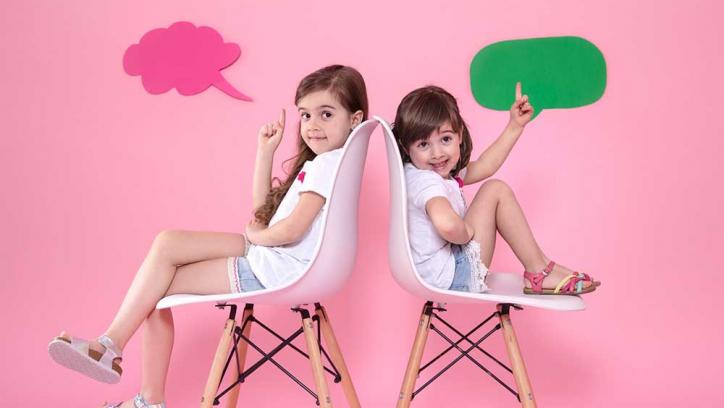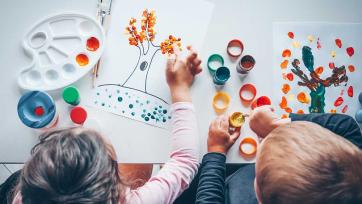Children begin to learn certain sounds immediately after birth. They will cry, coo, and gurgle until they are around one year old when they will likely pronounce their first word. As your infant becomes a toddler, you will have a great deal of work to help them learn the language and get along with others.

Toddlers are adept at observing and mimicking what they see, so you must be mindful of your speech and movement. To assist your toddler in reaching developmental milestones, you must first recognize that every kid develops and learns at a different rate. When your child is ready to start talking, the following will help them acquire new words and interact with others:
Encourage infants to play
Most toddlers are naturally playful, which is beneficial since it is the greatest method for them to develop, learn, and discover the world. You have more opportunities to chat and listen when your kid plays more. You'll be astonished by how fast they learn if you continue to converse with them and have fun while repeating words.
For a game to be effective, your child must communicate and engage with other children. If you play with your kid often while they are small, they are likely to use humorous language by age three. Keep in mind that it might be difficult for toddlers to attempt to communicate with you but not be able to do so. Instead of sometimes correcting them, try encouraging them.
Adequate Television Involvement
You may show your infant television images and noises as a means of communication. Unless your infant is playing with you or engaging in conversation, it is best not to allow them to watch television. Ensure your youngster watches no more than one to two hours of television daily. Otherwise, they may become couch potatoes.
Also, monitor what your child views on television since it may form their personality. In this digital era, when practically every parent has a TV and internet subscription, the only thing you can do for your kid is choosing age-appropriate entertainment. If your kid is exposed to unhelpful or cruel information, it might make them more aggressive and hinder their ability to get along with others.
Thanks to the Internet, you can choose which programs your youngster should watch. Your youngster may also see various stuff on social networking sites. It is safer than allowing kids to view stuff you cannot control.
Dialog with your youngster
When your young child speaks to you, you should not repeat what they say. Instead, communicate with them as if they were adults. It may sound odd, but it gives your youngster more words to learn, enhancing their vocabulary. When you get home from work, give your child a warm embrace and inquire about their day. Then describe your day to them.
There will undoubtedly be some back-and-forth, but you can be assured that someone is listening. If you do not communicate with your kid, you may see them leading a monotonous, lonely existence, which might damage other crucial phases of their growth. They will have little to say because they hear little.
It will help if you read aloud to them
No of the age of your kid, you should spend a great deal of time reading to them. As kids mature, they go from basic tales to more complex ones. The time they spend together will teach them how to get along with others, and the noises you make while reading will be remembered.
Picture books are wonderful for young children since they are colorful and entertaining. They will keep your youngster engaged and assist them in learning a large number of new words. If a youngster read a book daily, their vocabulary will increase by up to 1,400,000 words compared to those who do not.
Purchase Animal Toys
Plastic or wooden animal toys may be bought at baby shops. The toys are entertaining and inspire your youngster to play in novel ways. You may even use sign language to assist your infant in learning new words.
Teaching your child the names and sounds of many animals is enjoyable. They will likely pay attention if you shout out the name and sound of each animal toy. Repeat until your youngster can identify the creatures alone.
Children Must Acquire Valuable Social Skills
With strong social skills, children can get along with their classmates. Your kid cannot acquire all these talents at once, so be patient and assist them while they develop in other areas. You should not expect your youngster to possess or fast acquire these talents. It will need time and effort to reach the goal. A Montessori daycare is another setting where these skills may be learned.
How Empathy Allows Young Children to Develop Social Skills
Every parent must assist their kid in building habits early in life. Understanding and caring about other people's experiences is empathy. Helping your toddler develop empathy will provide them with a solid foundation for the social and emotional abilities they will need for life.
You must demonstrate concern for others to educate your kid to care for others. The more you repeat these actions, the more probable your child will remember them. Instead of penalizing your child if they bully other children, try to comprehend how the other children feel.
If your kid has difficult periods of frustration and fury, do not attempt to solve the situation to save them the suffering. Even if you cause somebody to feel awful, it is essential to recognize their suffering and express your concern. Your youngster will know that these occurrences are common and that they should care when they occur to others.
Findings
To assist your child in acquiring more vocabulary and communicating with people, you must expose them to the outside world. Many parents commit the error of keeping their children too isolated from others. Your youngster should encounter as many individuals as possible in a secure setting. It helps kids learn rapidly and develop the social skills necessary.








